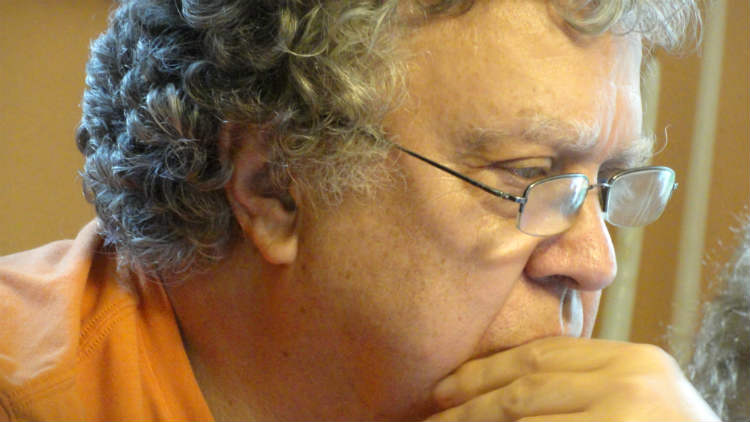
A Rebuttal of Elias Alucard
EUGENE M. MCCARTHY, PHD GENETICS, ΦΒΚ
The following text contains a series of responses to Elias Alucard, a moderator on forumbiodiversity.com. His comments were prompted by a visitor to that website, writing under the pseudonym of Power77, who posed certain questions about my theory of human origins:
Hello everyone,
I have been more or less interested for quite some time by this website owned by American evolutionary biologist Eugene M. McCarthy which proposes scientific ideas that might seem "unorthodox" to some but are nevertheless intriguing.
Roughly speaking, Mr. McCarthy (whom I know quite well thanks to Google Hangouts) thinks we evolved from a cross between an ape species related to the current bonobos and a porcine species akin to the domestic pigs. Although the idea may seem absurd at first glance, it surprisingly catches our attention as soon as we finish reading the site explaining it in depth!
The questions posed by “Power77” were the following:
Knowing that this forum contains a number of anthropology enthusiasts (and therefore contains people interested by the question of our origins as well as by evolution in general), I have a couple of questions for people who might be interested by this thread (especially you, @EliasAlucard):
1) Do you think evolution can be (or is) driven by hybridization?
2) If so, do you think that conventional theories on evolution are mistaken?
3) What do you think of McCarthy's theory which claims that humans are descendants of ape-pig hybrids?
4) Is McCarthy a nutcase or a misunderstood genius?
Comment #1:
“Power77” said:
I have been more or less interested for quite some time by this website owned by American evolutionary biologist Eugene M. McCarthy which proposes scientific ideas that might seem “unorthodox” to some but are nevertheless intriguing.
In response Alucard commented,
It's not that his ideas are unorthodox, it's that he has misunderstood evolution. He also sounds like Muslims with their “Christians and Jews descend from apes and pigs” rhetoric.
My response: To deal with Alucard’s second comment first, Muslims do not say that “Christians and Jews descend from apes and pigs.” Rather, the Quran (Verse 5:60) says that Allah transformed some evil doers into apes and swine. Some Muslim racists (and not non-racist Muslims who strictly adhere to the Quran) do in fact mistakenly cite the Quran as saying that Christians and Jews are the descendants of apes and pigs. But racists of all stripes, and not just Muslim racists, commonly misrepresent the facts in order to promote their own prejudices. In contrast, the theory that I offer posits that apes and pigs hybridized to produce humans, that is, that all humans, and not just Christians and Jews descend from apes and pigs.
As for his first comment, I believe, given that I have a masters and Ph.D. in genetics from one of the foremost genetics departments in the U.S., and given that I studied for years under leading population geneticists, several of whom were National Academy members, I think it’s fair to assume that I have a better understanding of the standard theory of evolution than most people. If I hadn’t, my professors would not have granted me my degrees. However, that very understanding of conventional theory, and with it an understanding of its flaws, is the very thing that has led me to propose an alternative theory of evolution, emphasizing the role of stabilization processes triggered, mainly, by hybridization.
In contrast, I cannot find that Mr. Alucard has any degree in any field of biology whatsoever. (Please correct me if I'm wrong Mr. Alucard.)
Comment #2:
“Power77” said:
Roughly speaking, Mr. McCarthy (whom I know quite well thanks to Google Hangouts) thinks we evolved from a cross between an ape species related to the current bonobos and a porcine species akin to the domestic pigs. Although the idea may seem absurd at first glance, it surprisingly catches our attention as soon as we finish reading the site explaining it in depth!
In response Alucard commented, “So invite him over and let him defend his hypothesis.”
My response: I have elsewhere already explained, at length, why the theory of human origins I propose is philosophically preferable to conventional theory. That explanation is so long that it would be absurd to attempt to repeat it on forumbiodiversity.com. So I would counter by inviting Mr. Alucard to come to my site and read my explanation there, where it is already presented in its entirety.
Comment #3:
“Power77” said: “1) Do you think evolution can be (or is) driven by hybridization?”
In response Alucard commented
Yes, but it's not really required. Evolution is inaccurate copying. That's really all evolution is. Other mechanisms, like natural selection, or sexual selection, or artificial selection, or population bottlenecks, and hybridization for that matter, these are aspects of evolution; they influence evolution, but if the self-replication process wasn't less than perfect, evolution wouldn't be possible.
My response: With regard to Mr. Alucard’s first sentence, note that “Power77” does not ask if hybridization is “required” for evolution to occur. Nor do I myself anywhere claim that it is. What I do argue is that it is reasonable to suppose that new forms of life are typically the products of stabilization processes triggered by hybridization. But this is not the same as saying hybridization is required. So Mr. Alucard here misrepresents what I say, perhaps because he simply doesn’t know what I say, or possibly—and this would be insidious—he is intentionally misrepresenting my position because a misrepresentation is easier to defeat than my real argument (i.e, he might be raising a straw man).
With regard to the remaining sentences in the quotation (“Evolution is inaccurate… evolution wouldn’t be possible.”), Mr. Alucard, should keep in mind that the general theory of evolution that I propose—within the context of which I evaluate the specific question of human origins—differs so much in its axioms from conventional Darwinian theory that the very terms he uses either take on a new meaning (e.g., natural selection) or cease to have any meaning at all (e.g., sexual selection). Even the word evolution itself has a different meaning under that theory (what I call stabilization theory), that is, the mechanisms that it cites, for the most part, differ significantly from those usually cited by standard theory. In short, Mr. Alucard’s comments (“Evolution is inaccurate… evolution wouldn’t be possible.”) here are mostly irrelevant because he’s attempting to discuss something with which he is entirely unfamiliar and therefore can speak of only in a nonsensical way. Not to be insulting, an apt analogy might be that of a caveman describing a rocket ship.
Comment #4:
“Power77” said: “2) If so, do you think that conventional theories on evolution are mistaken?”
In response Alucard commented
No. Problem is, they're rarely explained well enough, in the sense that clarity is often lacking on some important issues. For example, the conventional explanation of human origins, is that "we evolved from apes", well, that's true, but the real truth is, that we're still apes. We're just a different ape lineage from the mainstream misunderstanding of the word "ape", which is a chimpanzee or a gorilla. It's very true that we humans deviate strongly in our physical appearance from other apes, and primates, and we look less "ape" so to say, but we're really just another ape linage [sic].
So with that said, it's quite likely that this McCarthy guy has also misunderstood mainstream evolutionary theories, and now he's trying to come up with a different explanation that he believes fills the holes/gaps.
My response: In the first of these two paragraphs, after responding with a blank “No” to the question (which is a mere opinion delivered without explanation or justification), Mr. Alucard raises a different issue that seems to have little to do with the question itself, that is, he claims the standard explanation of human origins (“we evolved from apes”) somehow misrepresents what he calls “the real truth.” He goes on to explicitly state what he considers this “real truth” to be (i.e., that “we’re still apes”). But here he seems merely to be indulging in more opinion by expressing a certain disgruntlement he harbors over the fact that most people don’t think of humans as apes. But as I say, this peevishness of his has nothing to do with the question of whether the conventional theory of evolution is mistaken.
In the second paragraph, he says that “it’s quite likely that this McCarthy guy has also misunderstood mainstream evolutionary theories.” I can only ask how likely would it be that I misunderstand mainstream evolutionary theory when I spent years studying that topic in graduate school under the supervision of widely recognized authorities on that topic, who would never have let me slide by if I had not understood that topic? However, Mr. Alucard is correct in saying that I have tried to come up with a different explanation intended to fill certain the gaps in standard theory. I specifically explain the problems that I see with standard theory here.
Comment #5:
“Power77” said: “3) What do you think of McCarthy's theory which claims that humans are descendants of ape-pig hybrids?”
In response Alucard commented
Like I said: he has misunderstood evolution. Hybrids are only possible within the same genus, before full speciation has taken place, like for example homo sapiens + Neanderthals, that sort of stuff. Also tigers and lions can still produce offspring (but fertile offspring is difficult) , which are tigon and ligers. These are the sort of hybrids that are possible, but the genetic compatibility between apes and pigs, we're talking tens of millions of years back in time here, the last common ancestor between apes and pigs, and so, prehistoric hominids were simply not capable of reproducing with pigs.
My response: “Power77,” I happen to know, has made an extensive study of the information on mammalian hybrids collected on my website. So he will understand that these claims of Mr. Alucard about the limitations on hybridization are extremely misleading, although, no doubt, unintentionally so, given that he seems to be merely repeating what has been repeatedly said before him, assertions that he seems to have no reason to doubt. But in reality, in claiming that only very similar kinds of animals can hybridize, he’s merely parroting what people claimed even in ancient times, long before the age of science. Only experimentation and observation can determine the veracity of such a conclusions, not arm-chair speculation.
And it is not as if there were no evidence of interordinal crosses among animals occurring. Actually, there’s a great deal. It’s just that not everyone accepts that evidence. Among birds, there are numerous reports alleging the occurrence of such crosses. Here are some examples:
- Pigeon (Columba livia) × Domestic Fowl (Gallus gallus);
- Domestic Duck (Anas platyrhynchos) × Domestic Fowl;
- Lyrebird (Menura novaehollandiae) × Domestic Fowl;
- Budgerigar (Melopsittacus undulatus) × Domestic Canary (Serinus domesticus);
- Turquoisine Parakeet (Neophema pulchella) × Domestic Canary.
to name a few. For mammals we have, among many, such crosses as:
Using artificial insemination, Newman (1915, 1917 and 1918) obtained interordinal hybrids from various fish crosses. In particular, he describes hybrids he produced between mackerel and mud minnow (the latter belongs to Order Cyprinodontiformes, and the former to Order Perciformes). And there is even seemingly good reason to suspect that the echidnas and the platypus are derived from crosses between mammals and birds. Margulis et al. (2011, pp. 188-194) even list various probable interphylum crosses, which would be even more distant than any of the crosses just mentioned. And what do we have against all this evidence? Seemingly only a lot of preconceptions about what’s possible and what’s not.
Comment #6:
“Power77” said: “4) Is McCarthy a nutcase or a misunderstood genius?”
In response Alucard responded with the following four paragraphs, which I will address one by one
Paragraph 1:
My response: In the opening sentences of his great work Novum Organum, the English philosopher Francis Bacon, who has been called the father of empiricism, commented that
What I think he meant by this was that people who claim that there is only one correct view on any given question—and who arrogantly dismiss, or even ridicule, views contrary to the one they themselves espouse—contribute to other people ceasing to investigate that question, in some cases out of a fear of ridicule, in others out of a deference to authority. But investigation, not dogma, is the very soul of science. And history tells us that there is definitely not a single theory in any given field. What’s typical is for one theory to gain wide—though very rarely uniform and undeviating—acceptance by scientists, but for that theory subsequently to be replaced by another. This is what scientific revolutions are all about. Endless examples could be given, but a very well-known case is the replacement of the geocentric model of the solar system with a heliocentric one. The replacements generally catch on because they account for observations that the previous theories did not. So what we want, almost more than anything else in science, is new points of view, new ways of explaining phenomena. So it is the people who dogmatize, that is, those who maintain that there is only one truth that could possibly be correct, who damage science more than any others.
Paragraph 2:
My response: Given the information supplied about hybrids above (which is only the very tip of the iceberg), Mr. Alucard’s claims about hybrids here are an obvious misrepresentation of the true state of affairs. As to proving what he thinks (though he uses the “royal we”) is wrong, that’s unnecessary. All that’s needed with a scientific theory is for it to better explain available data. And that is, I maintain, what the theory I have proposed actually does.
Paragraph 3:
My response: Though I have racked my brains, I simply can’t imagine how calling names might fail to qualify as being rude. But leaving that question aside, isn’t it true that every groundbreaking idea was first thought of by someone, by some real person? And there is nothing in sharing an idea that is, in itself, arrogant. Indeed, it may just be a matter of certain individuals who haven’t had any ideas of their own envying the person who has (and therefore calling that person arrogant). My own reason for sharing my ideas is that I genuinely believe them to be improved explanations. They make sense of certain things that don’t otherwise make much sense. And really, I think it is primarily through the thinking and investigation of individuals that nearly all progress in science is made. As Francis Bacon advised (Novum Organum),
It’s in departing from the multitude and their widely accepted dogmas, that we can come to think about things in new, and perhaps better, ways.
Paragraph 4:
My response: Even if he did drop out of school, he has failed to convince me that he has any clear understanding of even conventional evolutionary theory, let alone my own theories, which, as he himself admits, he has never read.
 Chicken-pigeon hybrids
Chicken-pigeon hybrids Pig-human hybrids
Pig-human hybrids Cow-human hybrids
Cow-human hybrids